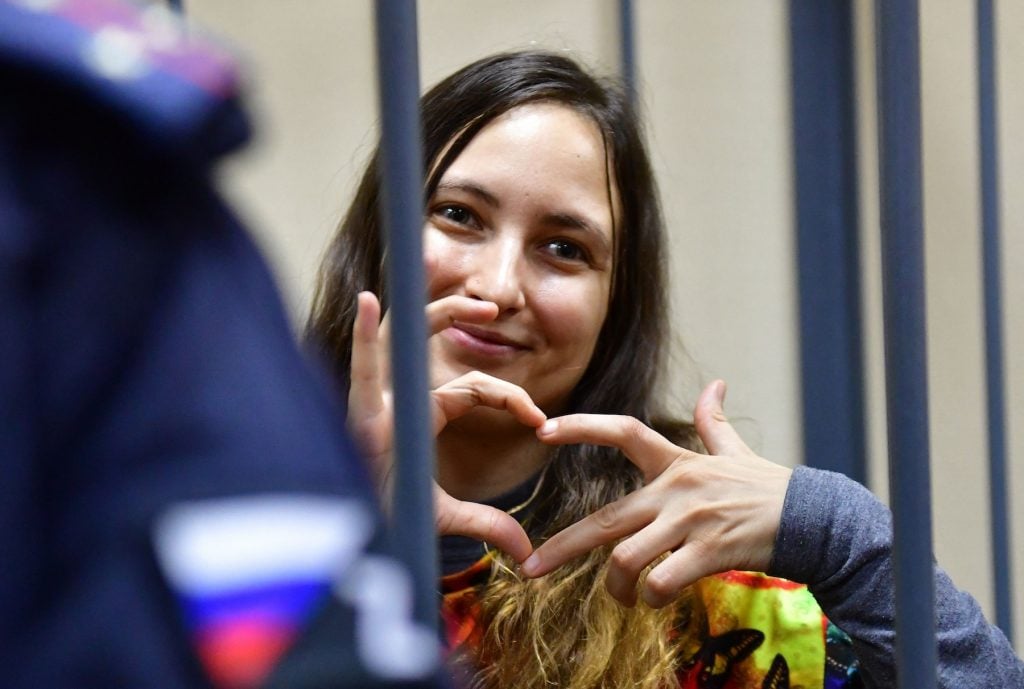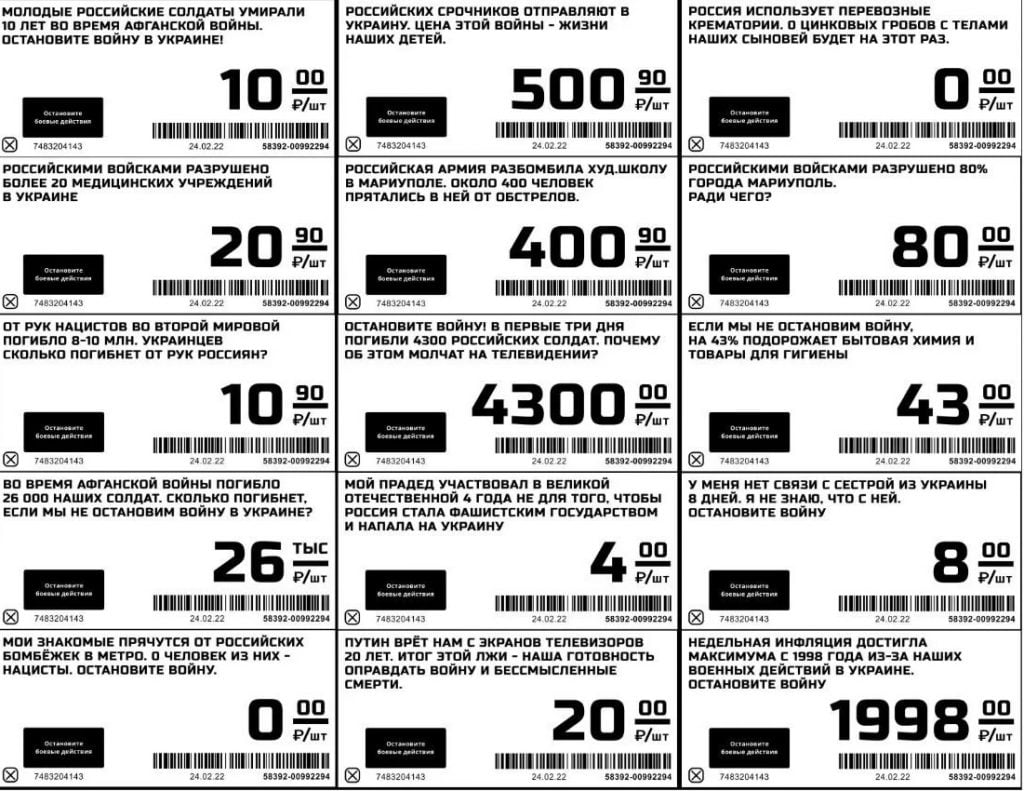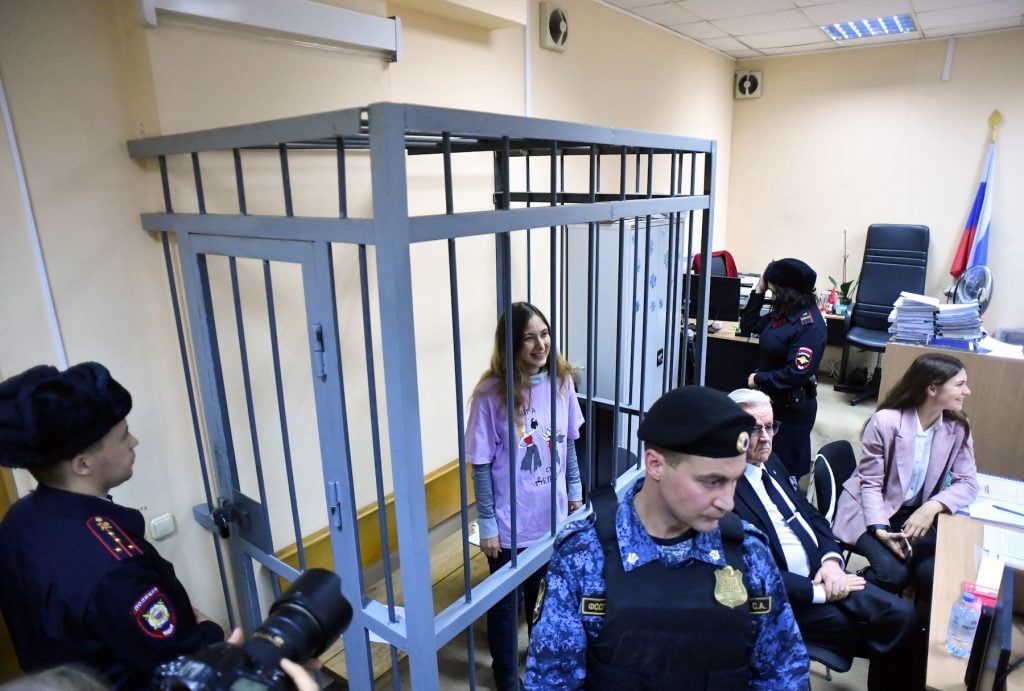Law & Politics
A Historic Act of Diplomacy Freed This Russian Artist. Here’s the Subtle Protest That Got Her Locked Up
Sasha Skochilenko became an international symbol of Russia's crackdown on anti-war speech.

Sasha Skochilenko became an international symbol of Russia's crackdown on anti-war speech.

Ben Davis

It was such a tiny gesture: Just five fake price tags placed in a supermarket in St. Petersburg, swapping normal data with slogans against Russia’s war in Ukraine.
However, this act would land artist Aleksandra Y. Skochilenko, known as Sasha, in prison, and make her a symbol of the dramatic crackdown on Russian civil society in the process. One week ago, Skochilenko was among those freed in the largest prisoner swap between the United States and Russia since the Cold War.
Just how small and personal her artistic act of protest was versus how harsh the consequences were and how global its ultimate profile would be is itself striking.
Skochilenko placed the fake tags on March 31, 2022, just a month after the start of the Ukraine war and weeks after new laws were enacted suppressing anything deemed anti-war propaganda, specifically anything seen as undermining the official narrative about the invasion. The labels read:
— “Russian conscripts are being sent to Ukraine. The cost of this war is the lives of our children. Stop the war.”
— “In the first three days, 4300 Russian soldiers died. Why is this not being talked about on television?”
— “Putin has been lying to us on television for 20 years. The result of these lies is our readiness to justify the war and senseless deaths.”
— “My great-grandfather participated in WW2 for four years not for Russia to become a fascist state and attack Ukraine.”
— “The Russian army bombed an art school in Mariupol where about 400 people were hiding from shelling.”
While shopping at the store, a 72-year-old retiree noticed the price tag with the text about the Mariupol art school bombing (an event widely reported in international media at the time). Outraged, she confronted the store security guard, and then a cashier, but felt that neither was sufficiently interested. She then “repeatedly asked the cashier to call the manager.” When the manager didn’t arrive, she took the label home and got the police involved, eventually leading to Skochilenko’s arrest.
“I was extremely outraged by this slander I read because I sympathize with Russian soldiers in Ukraine a lot, and watch all the news about this,” the woman testified, saying that she had been “shaking with indignation” when she read the text. “Our soldiers would not have allowed a bombing of peaceful civilian objects, such as a school.”

Online graphic for anti-war labels in the form of pricetags.
Sasha Skochilenko graduated in 2017 in Sociology and Anthropology from the former Smolny College/Faculty of Liberal Arts and Sciences in St. Petersburg as part of a joint program between St. Petersburg State University and Bard College in upstate New York. Her studies showed an interest in the meeting of consumerism and propaganda. Writing for Bard’s website, professor Ilya Kalinin remembered that her degree focused on state influence on children’s products in Russia. (In 2021, Bard was placed on a list of “undesirable” organizations in Russia, and is no longer allowed to operate joint programs.)
Nevertheless, the idea for the fake price tags was actually not Skochilenko’s. A group called the Feminist Anti-War Resistance (FAR) had launched immediately after the invasion of Ukraine, promoting tactics including stamping anti-war slogans on banknotes and installing handmade wooden crosses in various Russian cities to commemorate civilian victims of the war.
We need your help ❤️ This is our friend Sasha Skochilenko. She is facing 10 years in prison. Her crime? Replacing supermarket price labels with anti-war appeals and information on Russian attacks on civilians in Ukraine. pic.twitter.com/0DfGVgLM8f
— Soviet Visuals (@sovietvisuals) April 15, 2022
The fake price tags Skochilenko used were print-outs of images that FAR had circulated online. “By replacing something very routine with something alien and unusual, we show that there is not a single place in our country that would not be affected by the war, and we do not let people simply close their eyes to what is happening,” the group explained on its Telegram channel, according to Amnesty International. (The labels fit into the genre of guerrilla public art critics sometimes call “culture jamming” or “subvertising.”)

Alexandra Skochilenko at a court hearing in Saint Petersburg on January 20, 2023. (Photo by Olga Maltseva/AFP via Getty Images)
During her trial, Skochilenko cut a striking figure, seen surrounded by a heavy guard detail in rainbow tie-dye or in a shirt with her own artwork on it, flashing heart signs with her hands while being held in a cage. In her final address before sentencing, she conveyed a passionate awareness about the larger stage she was on:
My process is widely covered in Russia and in the world; news videos and documentary films are being made, and even books are being written about it. So regardless of the verdict you deliver, you will become part of history. Perhaps you will become part of history as the person who convicted me; perhaps as the person who acquitted me; perhaps as the person who made a neutral decision and gave me a fine, a conditional sentence, or a time that I have already served. It is all in your hands—but remember: everybody knows, everybody sees that you’re not trying a terrorist in this court. You’re not trying an extremist. You’re not even trying a political activist. You’re trying a musician, an artist, and a pacifist.
In the end, Skochilenko was sentenced to seven years in prison for “disseminating knowingly false information about the Russian Armed Forces.”
Supporters had been concerned about her health in jail, including her mental health. Skochilenko had earlier online success with a comic book about her mental health struggles, published as A Book About Depression (an English translation can be viewed online). During her captivity, she kept a prison diary in the form of drawings, some of which were shown last year in London in a solidarity fundraiser show called “Skochilenko: The Price of Freedom.”
Skochilenko is said to have been in the dark about last week’s release until right before it actually happened. She told the New York Times that, even after being told she was being transferred in a “political exchange,” her main thought was: “They’re going to drive us to a forest now and shoot us.”
In a grateful statement to supporters on Telegram, Skochilenko’s partner, Sonia Subbotina, stated that the duo was not yet ready to speak further to the press, but would in the future. In the meantime, here is a short video from PBS’s Frontline from during her trial that explains more about the case, and gives a sense of the international significance her small gesture of protest assumed.